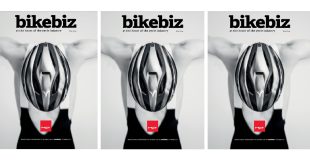Rebecca Morley sits down with Team Africa Rising CEO and last year’s BikeBiz Woman of the Year Kimberly Coats
This piece first appeared in the October edition of BikeBiz magazine – get your free subscription here
“As pretty much the only woman involved in the development of professional cycling across Africa through the Team Africa Rising non-profit, she has spent over a decade both on the ground in Africa, and remotely, fighting almost insurmountable barriers and hurdles, corruption and high levels of misogyny” – these were the words used to describe Team Africa Rising (TAR) CEO Kimberly Coats, who was voted BikeBiz Woman of the Year in 2022.
Since 2007, TAR, formerly known as Team Rwanda Cycling, has supported the development of cycling across the African continent and helped dozens of riders achieve their dream of riding at the professional level.
The non-profit assists federations, clubs, race organisers, coaches, mechanics, and cyclists throughout the continent, and its goal is to train not only African cyclists and launch them onto the professional circuit, but to train Africans to run all aspects of the sport, in order to produce a steady stream of talent from the continent.
TAR also works with the UCI World Cycling Center in South Africa as a liaison between up-and-coming talent and the next level training programmes at the UCI. Its multi-year plan includes development of a Velodrome Complex in Benin.
And in 2025, an African nation, Rwanda, will host the UCI Road Cycling World Championships for the first time, and TAR is working with multiple countries on their preparation.

“Team Africa Rising brings all the people together and we figure out ways to maximise getting equipment to the different areas, getting human resources – so coaches, mechanics – we’re planning on doing a mechanics course in Benin before the end of the year, just putting in all the infrastructure,” Team Africa Rising CEO Kimberly Coats recently told BikeBiz.
Team Rwanda’s most famous cyclist is Adrien Niyonshuti, who qualified to represent Rwanda in the cross-country mountain bike race during the 2012 Summer Olympic Games in London. This moment is one of Coats’ proudest, she said.
“That was a super big deal, because Rwanda had never qualified for the Olympics – they’d gotten some wildcards but they’d never qualified. He did the work, he qualified. That was really powerful.”
Overcoming obstacles
On the importance of the work TAR does, Coats explained how an European or even American kid would have ‘no idea’ the number of obstacles a black African cyclist has had to overcome when they roll up to the start line.
“They don’t have parents who have credit cards, who can finance a trip to Europe to race. It just takes so much.
“And then of course there’s all the infrastructure. Rwanda is hosting the World Championships and really doesn’t have a bike shop yet. One of the things that we do is not only look for riders that we can move through the system, but we train all the people with the infrastructure that continue it long term.”
TAR has recently been focusing on West Africa, and has been working in Benin with the Benin National Cycling Team and the Benin Cycling Federation (FEBECY).
Niyonshuti is the National Coach, and he spent most of January and February in Benin working with the team, alongside Coats, who worked on overhauling the nutrition and diet of the cyclists along with teaching strength training and yoga programmes.
“In April, we had six weeks prior to the Tour du Benin, and we had coaches that we’re training in Benin and mechanics, and they were with us the entire time, learning what we learned,” Coats said.
The Tour du Benin is a multi-day road cycling race annually held in Benin, and since 2022 it has been held as a 2.2 category event on the UCI Africa Tour.
TAR also recently did a big fundraiser to get Benin 28 Scott bikes, as the bikes the young people had previously would be in such a bad state that they couldn’t be used on Wahoo Fitness trainers, and they can’t race on Zwift.
“The Federation, along with us, went together and we raised the money for these 28 bikes,” said Coats. “They’re all entry-level race bikes – they’ll all be the same, all the same parts. We will send them with spare parts. Kids that show some promise will get that bike.”

Closing the gap
TAR is also committed to closing the gap for African women cyclists, as not only do African women face all the typical challenges of female cyclists throughout the sport, e.g. lack of sponsorship, equipment, and teams, but these women also face cultural barriers and lack of representation at the leadership levels from clubs through federations to the top levels of the sport.
The non-profit is sponsoring the women’s lead jersey for the 2023 Tour du Lunsar, and is training and preparing the women of Benin’s National Cycling Team ahead of the 2023 African Road and Track Continental Championships.
Coats added: “What we’re focusing on next year is taking really young kids to Europe, taking the 15-17-year-olds. The age is getting younger and younger, especially men. They’re giving kids WorldTour pro contracts at 18.
“For women, it’s a little bit better. One of the really great teams has been Canyon//SRAM. They’re continuing to look at African women cyclists, so that’s a huge plus, but we need more teams like that. What’s great about Canyon//SRAM is the guy who runs the women’s team, the development team, used to work at the UCI, so he understands the unique challenges that you have with African cyclists.”
 BikeBiz Bicycle and cycling retail news
BikeBiz Bicycle and cycling retail news


